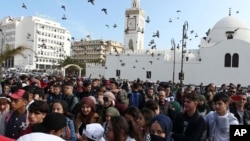Algerian teenagers and lawyers held protests Monday, and workers held scattered walkouts, as their tense nation waits to see whether ailing President Abdelaziz Bouteflika offers any concessions in the face of unprecedented protests.
Algerian media and protest leaders expect it could be a decisive day for the gas-rich North African country, after Bouteflika returned home Sunday from two weeks in a Swiss hospital.
His absence saw growing demonstrations demanding that he withdraw his candidacy for a fifth term in next month's election. Algerians have hardly seen Bouteflika since he suffered a stroke in 2013, and anger has mounted at the country's secretive power structure.
Security was high Monday in Algiers, where some businesses were shuttered by a second day of strikes. Other stores and administrative offices remained open.
Middle school and high school students held protests in several towns, according to local media. Education Minister Nouria Bengahbrit appealed on her Facebook page for protesters to "leave schools out of political turbulence'' shaking the country.
Meanwhile, lawyers in their black robes gathered Monday in front of courthouses to join calls for Bouteflika to abandon his bid for another term.
Exceptionally, some judges also joined a lawyers' protest in the city of Bedjaia in Kabylie, a region historically opposed to the powers-that-be in Algiers. Judges are normally banned from publicly demonstrating, like police and soldiers.
The unprecedented citizens' revolt began last month and has drawn millions into the streets of cities across the country to say no to a fifth term for their 82-year-old president — and no to a system blamed for corruption and keeping Bouteflika in office despite his ailments.
A wily political survivor, Bouteflika fought in Algeria's independence war against French forces and has played a role in Algeria's major developments for the past half-century. He became president in 1999 and reconciled a nation riven by a deadly Islamic insurgency, but questions swirl over whether he is really running the country today.
The protests have surprised Algeria's opaque leadership and freed up Algerians, long fearful of the watchful security apparatus, to openly criticize the president. Algerians are also letting out pent-up anger at corruption that has left the country's oil and gas riches in the hands of a few while millions of young people struggle to find jobs.
Army Chief of Staff Ahmed Gaid Salah initially threatened the protesters, but made what was seen as a significant turnaround Sunday, saying "the people and the army share friendship, solidarity and a future vision for Algeria.''
"The national patriotic army takes pride in being a part of this defiant nation, and cherishes sharing the same values and principles'' with the people, he said during a speech to engineering students.




